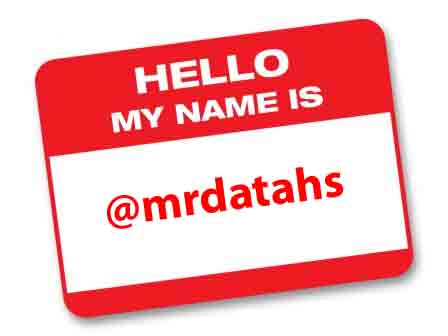What happens when your online identity no longer fits?

For a long time now, I've been mrdatahs. It's my ZDNet handle, my Twitter handle, my Facebook profile, my primary email address...you name it. It all started not long after I began teaching at our local high school, when a student suggested that I get a Gmail account. It was invitation-only at the time and when he made me a member of the exclusive little Gmail club, it didn't occur to me that chris.dawson@gmail.com would be a good idea. It had to be something interesting, right? I hadn't even started blogging yet and, in Internet years, 2004 is ancient history.
So I picked mrdatahs for my username. Most of the students either called me Mr. D or Dawson and I was at Athol High School, so mrdatahs seemed a nice fit. And after I started blogging for ZDNet and Jennifer Leggio introduced me to Twitter, it still seemed apt, so I became @mrdatahs.
Suddenly, I was writing for ZDNet, had thousands of followers on Twitter, and was building a professional following and digital footprint that had much more to do with me as Chris Dawson, writer/blogger/Ed Tech guy/Google Fan than it did with me as Mr. Dawson, Athol High School Teacher and Tech Guy. And then I started co-writing the Google blog, taking me farther from my AHS roots.
And then I wasn't even a teacher at the high school anymore. I was technology director for the district and worked out of the superintendent's office. It might not seem like a big deal, but a remarkable amount of my online presence was wrapped up in me being Mr. D at AHS. It didn't feel authentic and it certainly felt out of date and out of touch with where I stood professionally. People still said "Hi, Dawson" or "Hey Mr. D" when I'd go to the high school, though, for whatever crisis happened to be plaguing their network, so it was sort of OK.
I even thought about ways to re-parse my online identity. Mr. Data something...What could that HS mean? My mom suggested "helping students" but it was just too cheesy. So I ignored it. It was just an email address and Twitter handle, right? As long as people had me in their contacts or were following me on Twitter, did it matter?
Also see "Fun Friday: Hello! My Name Is @xStephenChapman!"
And then I resigned from my job with the school district to start my own consulting business. I was still consulting largely in educational technology fields, but was no longer affiliated in any way with the district containing the high school that inspired my moniker. In fact, it was time for a rebranding, a chance to reach out to potential customers, reinvigorate my interaction with Twitter (for too long, it had become a place where I posted links to my blogs and where I had followed so many people, I could no longer distinguish the signal from the noise), and make it clear that I was Chris Dawson, Ed Tech Consultant and Freelance Writer.
And I just couldn't do it. I didn't interact with Twitter as much as I should have, but a lot of people either reach out to me or link to my articles through the service. Would they make the switch to a new handle? Or even know that a new one existed if they didn't previously hang on my every Tweet (yes, my tongue is definitely in my cheek there, but I think you know what I mean)?
And what of my email? I have an email address for my company (of course, I set up a Google Apps account for the domain), but I still get 95% of my email (about 200 messages a day, not including spam) through my old mrdatahs Gmail account. This includes press contacts, professional contacts from my pre-consulting days, and countless other people that I just don't feel like migrating to a new address.
Even the new address is based on my new company name. What happens if that company name changes in 3 years? This new address is what's on my business card, but that original account is still my electronic lifeline.
Maybe it doesn't matter, but I'm inclined to think that it does. When a new business contact looks for me on Twitter, they don't identify that handle with the brand I want them to associate with me. The handle is meaningless to them. And yet I've invested quite a bit of time in my old identity. And we all need an identity online that can stay somewhat constant even as jobs come and go.
For now, for better or worse, I'm sticking with mrdatahs. It certainly points to my roots, at least. Yet if I had it to do over, I'd be chris.dawson@gmail.com. My name, at least, will probably not change. For those of us who might change our names, though, whether through marriage, adoption, or choice, how long do we want to be known as our old name online? If there's a messy divorce involved, probably not very long. So what's the solution?
I'm not 100% sure there is a silver bullet here. The message, though, is to choose wisely. Your online identity, just like your digital footprint, will follow you for a long time. And I'll probably be Mr. D. at AHS long after every teacher in that building has retired.
